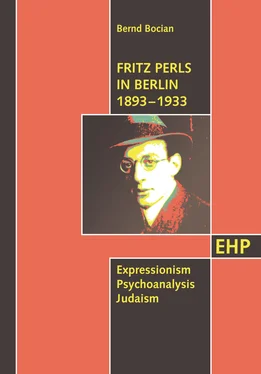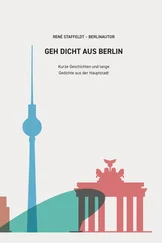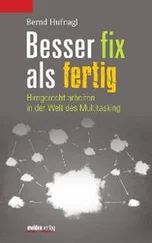Bernd Bocian - Fritz Perls in Berlin 1893 - 1933
Здесь есть возможность читать онлайн «Bernd Bocian - Fritz Perls in Berlin 1893 - 1933» — ознакомительный отрывок электронной книги совершенно бесплатно, а после прочтения отрывка купить полную версию. В некоторых случаях можно слушать аудио, скачать через торрент в формате fb2 и присутствует краткое содержание. Жанр: unrecognised, на английском языке. Описание произведения, (предисловие) а так же отзывы посетителей доступны на портале библиотеки ЛибКат.
- Название:Fritz Perls in Berlin 1893 - 1933
- Автор:
- Жанр:
- Год:неизвестен
- ISBN:нет данных
- Рейтинг книги:3 / 5. Голосов: 1
-
Избранное:Добавить в избранное
- Отзывы:
-
Ваша оценка:
- 60
- 1
- 2
- 3
- 4
- 5
Fritz Perls in Berlin 1893 - 1933: краткое содержание, описание и аннотация
Предлагаем к чтению аннотацию, описание, краткое содержание или предисловие (зависит от того, что написал сам автор книги «Fritz Perls in Berlin 1893 - 1933»). Если вы не нашли необходимую информацию о книге — напишите в комментариях, мы постараемся отыскать её.
Fritz Perls in Berlin 1893 - 1933 — читать онлайн ознакомительный отрывок
Ниже представлен текст книги, разбитый по страницам. Система сохранения места последней прочитанной страницы, позволяет с удобством читать онлайн бесплатно книгу «Fritz Perls in Berlin 1893 - 1933», без необходимости каждый раз заново искать на чём Вы остановились. Поставьте закладку, и сможете в любой момент перейти на страницу, на которой закончили чтение.
Интервал:
Закладка:
Using Fritz Perls as an example, I will also recall to mind the lasting value of specific life experiences of German Jews, thereby also remembering a constituent part of German culture that appears to have been routed, destroyed, and irrecoverably lost. It is important in this context to note that it was the very members of the Berlin cultural avant-garde, and even more decidedly the German Jews among them, who viewed themselves as embedded in a bourgeois-humanistic European culture, which they also legitimized through their direct personal and professional international contacts during the years of the Weimar Republic.
In regarding and designating Perls as a German Jew, a label I will later justify and discuss, it is my intention here to describe the individuals involved not merely as objects and victims, but also to portray them in Rürup’s sense as »individuals who actively participated in and contributed to the shaping of German history« (Rürup in Bundeszentrale 1991, 59). Rürup calls the history of German-Jewish relations a »grand and in some respects unique history that came to an abrupt and terrible end and was so thoroughly destroyed that even its traces in history have been blurred« (ibid.). Robert B. Goldmann, a »pre-war Jew« (Goldmann 1999, 10) living in New York, took a similar stance in Frankfurter Allgemeine Zeitung after the death of Ignaz Bubis, Chairman of the Central Committee for Jews in Germany. Goldmann argues that in America almost the only part of the history of European Jews, and thereby generally also of Jews in the German-speaking countries, for which there is any awareness, entails their flight, expulsion, and murder. Against that background, he makes a case for »an educational system where the history of German-speaking Jews in Central Europe is a key theme« (ibid.). Rürup and Goldmann, as well as Hermand (1996) and Mosse 7would like to prevent the creative life of Jews over the course of German history from fading into oblivion. In my opinion, the development of Gestalt therapy presents itself as a good example of this because something of the humanistic European spirit and the personal boundary experiences and survival strategies of those who represented this culture lives on within it.
Nevertheless, it is only possible to speak of German-Jewish culture in unilateral terms, that is, with respect to the majority of Jews living in Germany at the time, and appellations such as »the grand and unique history of a relation ship« must be seen in a relative light. There was practically no interest on the German side in an encounter or a dialogue with Judaism. The Jews who had assimilated themselves into German society and culture turned their Jewishness into a denomination, like the Catholics or Protestants. Ever since their legal emancipation, Jews possessed civil rights, and their assimilation made them members of German society who saw themselves as German citizens of the Jewish or Mosaic faith. Traverso has again pointed out most vehemently that emancipation did in fact dismantle the separate and separatist Jewish »nation,« but because of Germany’s differentiation between national and ethnic identity this for the most part voluntary renunciation was not followed by the acquisition of German ethnicity (Deutschtum) even if a percentage of the assimilated Jews subjectively believed that to be the case. »Whether they realized it or not, assimilated Jews lived in a kind of no-man’s land« (Traverso 1993, 9). The widely discussed and controversial German-Jewish symbiosis only applied to a numerically small although influential group of outsiders, in which national, social, or religious origin played no role (see Gay 1979, Hermand 1996, Mosse 1992, Scholem 1995, Traverso 1993). For me, Perls belonged to this group of often nonconformist individuals, whose view of the world against the backdrop of the European Enlightenment was shaped by Lebensphilosophie (philosophy of life), whose experience of life qualified them as members of the Expressionist generation, and who adopted left-liberal to extreme left-wing orientations no later than the German November Revolution of 1918. During the years of the Weimar Republic, that »republic of outsiders« (Gay 1989a), the avant-garde culture these individuals created became influential – although not dominant – and was crowned with success until its protagonists were expelled and sent fleeing, while outside of Germany the cultural myth of the Weimar Republic arose and particularly that of Berlin during »the wild twenties.« The basic fabric of Gestalt therapy, in my opinion, is woven from the intellectual and cultural material of these years; the development of Gestalt therapy through Fritz and Lore Perls preserved many an element of this culture by removing it to safety in the world beyond Germany’s borders.
The so-called Expressionist generation, those social outsiders and pioneers of modernity, were the individuals who experienced most consciously and suffered most intensely under the modernization process that was rapidly taking hold in Germany, particularly in the metropolis of Berlin. From their advanced posts, they were attempting to cope then with what today’s social diagnosticians of that era 8are calling an opportunity and a danger for individual identity formation in postmodern or globalized industrial nations. By this I mean phenomena such as the plurality of meanings and interpretations of the world, and also the dissolution of the traditional social and family ties that provide individuals the space potentially to shape their lives on their own terms, while at the same time subjecting them to the constraints and risks of constructing a self based on their own personal responsibility. During that age, only a small group of individuals was affected, namely, the avant-garde. Today, such »risky freedoms« (Beck 1986) confront an increasingly large part of the population. Against this background, the concept of Gestalt therapy presents itself in my view as an attempt to respond to the threats and opportunities raised by an ongoing process of social-psychological change that has encompassed ever larger segments of society since that time. Gestalt therapy carries within itself experiences that contain a utopia of wholeness as well as experience in dealing with disruption, dissociation, and threatened identity. It is an attempt undertaken by concrete individuals to respond to the general demands of modernity as well as its specifically German outgrowths.
In the following, I will review the history of the origins of Gestalt therapy, which is closely connected with the personal histories of Fritz and Lore Perls and the story of their emigration. Even if Fritz Perls, Lore Perls, and Paul Goodman, this »ménage à trois« to use the words of Lore Perls, must be viewed as the collective founders of Gestalt therapy, Fritz Perls still remains the »main intellectual initiator« (Frambach 1996, 44) in my eyes. 9Without Fritz Perls, Gestalt therapy would not have come into existence. In a certain sense, it was his »baby,« and he was also the one who made the baby known to the world. The picture cannot be complete without Lore Perls, but unfortunately a comprehensive examination of her life and thought has not yet been undertaken. However, Milan Sreckovic (1999) and Dan Bloom (2005) have elaborated the biographically and intellectually important core of such a project.
The time period examined in the present book spans more than half of Perls’s life, and the first forty years of a human lifetime surely contain in more or less pronounced form all of the important factors influencing the development of a personality. Until now, no separate study of the German phase of Fritz Perls’s life has been published, that is, none that exceeds the information contained in the books he or his wife published or provided during interviews. 10The biography by Shepard (1975) made no further contribution to the then known material on Perls’s German period. That applies as well to the book by Clarkson und Mackewn (1995) which was published almost twenty years later. I am unable to confirm Shepard’s comment that material on Perls’s »formative years« (Shepard 1975, xc) in Germany was inaccessible because of the Shoah, among other reasons. Rather, it appears that until now no one has conducted research in the area, nor has anyone to date delved into the pre-history of Gestalt therapy within the context of that period in German history. The monograph by Gaines (1979) remains valuable because his extensive compilation of personal recollections of Perls has also preserved important biographical material. 11
Читать дальшеИнтервал:
Закладка:
Похожие книги на «Fritz Perls in Berlin 1893 - 1933»
Представляем Вашему вниманию похожие книги на «Fritz Perls in Berlin 1893 - 1933» списком для выбора. Мы отобрали схожую по названию и смыслу литературу в надежде предоставить читателям больше вариантов отыскать новые, интересные, ещё непрочитанные произведения.
Обсуждение, отзывы о книге «Fritz Perls in Berlin 1893 - 1933» и просто собственные мнения читателей. Оставьте ваши комментарии, напишите, что Вы думаете о произведении, его смысле или главных героях. Укажите что конкретно понравилось, а что нет, и почему Вы так считаете.











